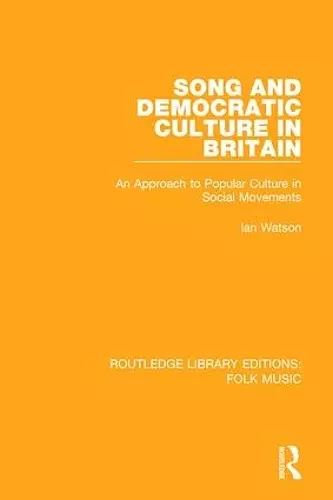Song and Democratic Culture in Britain
An Approach to Popular Culture in Social Movements
Format:Paperback
Publisher:Taylor & Francis Ltd
Published:26th Sep '17
Currently unavailable, and unfortunately no date known when it will be back
This paperback is available in another edition too:
- Hardback£115.00(9781138953413)

Originally published in 1983. Song has always been a natural way to record everyday experiences – an expression of celebration, commiseration, complaint and protest. This innovative book is a study of popular and working-class song combining several approaches to the subject. It is a history of working-class song in Britain which concentrates not simply on the songs and the singers but attempts to locate such song in its cultural context and apply principles of literary criticism to this essentially oral medium. It triggered controversy: some critics castigated its Marxist approach, others enthused that ‘such unabashed partisanship amply reveals the outstanding characteristic of Watson's book’. The author discusses the way in which the popular song, from Victorian times onwards, has been forced by the entertainment industry out of its roots in popular culture, to become a blander form of art with minimal critical potential. The book ends by considering the possibilities for a continued flourishing of a genuine popular song culture in an electronic age. It has become a standard title in bibliographies and curricula. Much has changed since 1983, not least in music; but this then innovative book still has a lot to say about popular song in its social and historical context.
Song and Democratic Culture was published in a binary, Cold-War world and triggered controversy. While some critics castigated its Marxist approach, others enthused that ‘such unabashed partisanship amply reveals the outstanding characteristic of Watson's book’ (Janet Oppenheim, American Historical Review). Singer and musicologist Sam Richards praised it as ‘a polemical, even missionary book’ (Folk Music Journal). Dick Gaughan championed the author’s case for 'a consistent and workable aesthetic based on a class view of folk music'; and it was Gaughan and Billy Bragg who were motivated to rearrange and record ‘The Red Flag’ with its original folk tune, to challenge Watson’s hypothesis on labour and ‘dignified’ chorus music (p.216).
ISBN: 9781138122307
Dimensions: unknown
Weight: 480g
258 pages